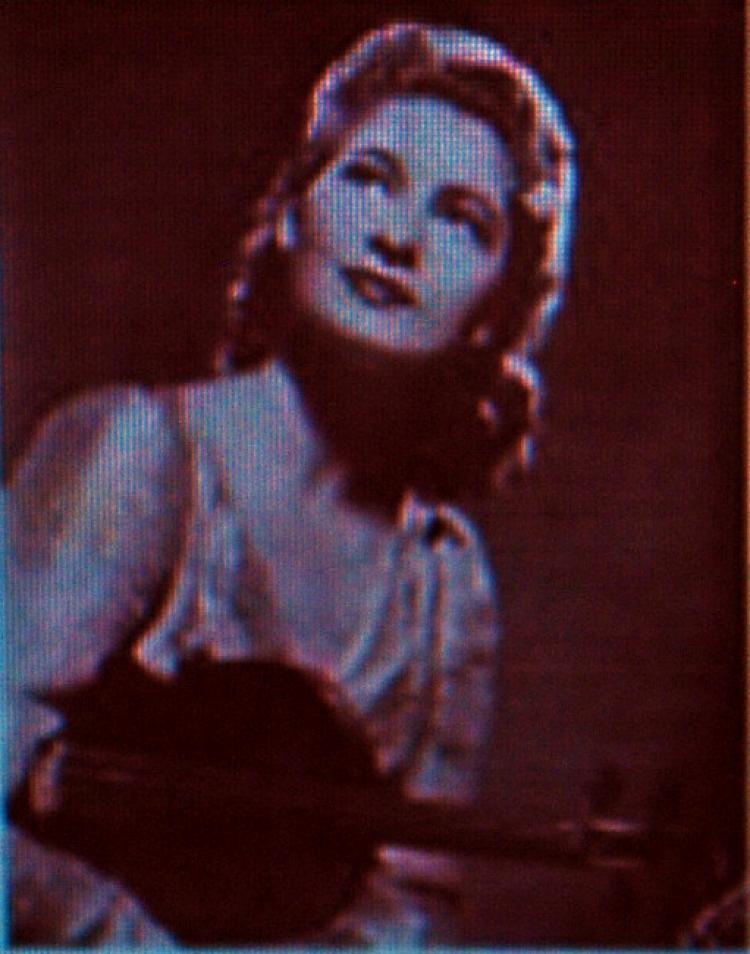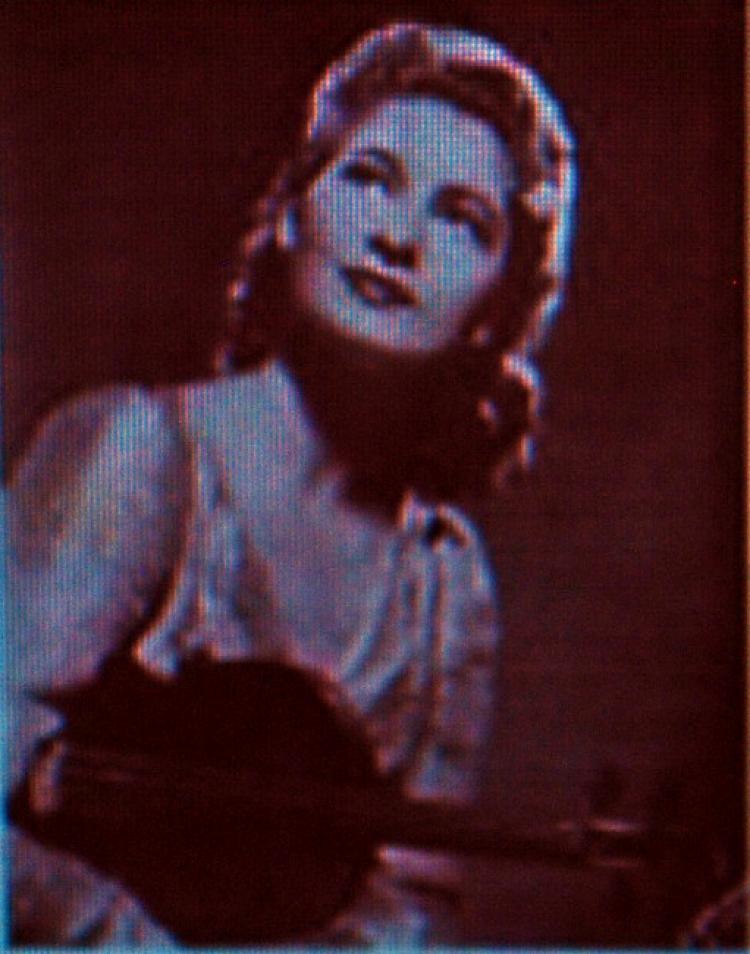To have received the feeling that all is possible and within grasp is surely necessary for an artist. Miriam Solovieff, the great violinist, gave me that feeling when she taught me. She had a great heart and really cared. Without a doubt she was one of my best teachers—just as I imagine a great Olympic skating coach might be.
Miriam Solovieff (d. 2004) was born in San Francisco in the early 1920s and was a family friend of my father Oscar Shumsky, as well as my Uncle William Carboni. But I learned little of her life in those years.
Later I discovered that Solovieff’s role model was actually not a violinist. In fact, it was Maria Callas whom she really loved. She actually looked like Callas in her younger years. It was the beauty of the character portrayal being at one with the music that Callas epitomized for her.
Naturally Solovieff’s flare for the dramatic was obvious, but really it was not a question of the dramatic. It was a question of making a character stand out, since to be a little speck on a tree did not interest her.
I studied with her in Paris in the 1980s, and this was the time that I got to know her. Although she no longer played at the time, her recordings of the Brahms “Sonatas” with Julius Katchen (sadly, never released), and the Schubert “Rondo,” as well as Rimsky Korsakov’s “Scherazade” can be found, and they reveal her wonderful talent.
My lessons would last for three hours, and then I would take her out for a lovely dinner, and we would talk for several more hours over good wine and beautiful French cuisine.
She had a very strong personality, and one needed to be on guard so as not to make a superficial comment which she might take the wrong way.
Miriam Solovieff had a reputation in Paris for saying something like: “You have no business entering this contest,” or “You really should not be playing that piece.”
I heard the reports, and I knew the people who voiced these complaints. Yet if these musicians had been honest with themselves and stepped up to the plate with an earnestness to resolve the issue, she might have responded differently. If she respected your earnestness, she was there for you.
She was a superb teacher.
Hers was not an abstract approach at all. In fact, she was very straightforward—just play as beautifully as possible. This was no easy task.
When I played badly, she really let me have it with nothing held back. The rough bow change or the false accent—she mimicked them back to me, and hearing the sound myself felt like a Mike Tyson punch to the face. I came to realize that an accent in the wrong place destroyed an otherwise lyrical passage. She never swept intonation problems under the rug.
When she came to my concerts, sometimes I could tell by the look on her face what she thought, and then I did not ask for her opinion—I actually already knew. At other times when I really played well, she made me feel that my playing was on the highest level and ranked among the finest.
She could be brutally honest, but, in my case, she was actually hugely supportive. She even pointed out to me that I seldom supported myself even when things went well.
Where some teachers would make a neurotic problem out of a fault, she would present a simple solution which would always improve the way something sounded.
One last note: When Solovieff was still a child prodigy, her father murdered all of her family in front of her eyes and tried to kill her as well. She narrowly escaped, and then her father took his own life. Her mother, on her deathbed, pleaded with Miriam to play her Town Hall debut a few days later in New York City.
Miriam followed her mother’s wishes and played a gorgeous recital, attended by many prominent figures. This feat in itself testifies to the great talent and character of Miriam Solovieff.
Eric Shumsky is a concert violist. For more information, see www.shumskymusic.com.
Miriam Solovieff (d. 2004) was born in San Francisco in the early 1920s and was a family friend of my father Oscar Shumsky, as well as my Uncle William Carboni. But I learned little of her life in those years.
Later I discovered that Solovieff’s role model was actually not a violinist. In fact, it was Maria Callas whom she really loved. She actually looked like Callas in her younger years. It was the beauty of the character portrayal being at one with the music that Callas epitomized for her.
Naturally Solovieff’s flare for the dramatic was obvious, but really it was not a question of the dramatic. It was a question of making a character stand out, since to be a little speck on a tree did not interest her.
I studied with her in Paris in the 1980s, and this was the time that I got to know her. Although she no longer played at the time, her recordings of the Brahms “Sonatas” with Julius Katchen (sadly, never released), and the Schubert “Rondo,” as well as Rimsky Korsakov’s “Scherazade” can be found, and they reveal her wonderful talent.
My lessons would last for three hours, and then I would take her out for a lovely dinner, and we would talk for several more hours over good wine and beautiful French cuisine.
She had a very strong personality, and one needed to be on guard so as not to make a superficial comment which she might take the wrong way.
Miriam Solovieff had a reputation in Paris for saying something like: “You have no business entering this contest,” or “You really should not be playing that piece.”
I heard the reports, and I knew the people who voiced these complaints. Yet if these musicians had been honest with themselves and stepped up to the plate with an earnestness to resolve the issue, she might have responded differently. If she respected your earnestness, she was there for you.
She was a superb teacher.
Hers was not an abstract approach at all. In fact, she was very straightforward—just play as beautifully as possible. This was no easy task.
When I played badly, she really let me have it with nothing held back. The rough bow change or the false accent—she mimicked them back to me, and hearing the sound myself felt like a Mike Tyson punch to the face. I came to realize that an accent in the wrong place destroyed an otherwise lyrical passage. She never swept intonation problems under the rug.
When she came to my concerts, sometimes I could tell by the look on her face what she thought, and then I did not ask for her opinion—I actually already knew. At other times when I really played well, she made me feel that my playing was on the highest level and ranked among the finest.
She could be brutally honest, but, in my case, she was actually hugely supportive. She even pointed out to me that I seldom supported myself even when things went well.
Where some teachers would make a neurotic problem out of a fault, she would present a simple solution which would always improve the way something sounded.
One last note: When Solovieff was still a child prodigy, her father murdered all of her family in front of her eyes and tried to kill her as well. She narrowly escaped, and then her father took his own life. Her mother, on her deathbed, pleaded with Miriam to play her Town Hall debut a few days later in New York City.
Miriam followed her mother’s wishes and played a gorgeous recital, attended by many prominent figures. This feat in itself testifies to the great talent and character of Miriam Solovieff.
Eric Shumsky is a concert violist. For more information, see www.shumskymusic.com.







